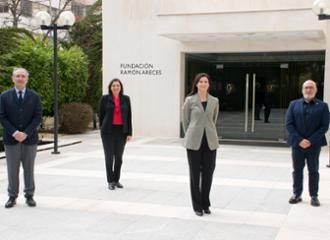Research projects
Start of main content
Using genetic engineering to obtain strains of Clostridium cellulolyticum and Rhodobacter capsulatus that overproduce hydrogen
15th National Programme for the allocation of Research Grants for Life and Matter Sciences
Bioenergy
Research Centre or Institution : Instituto de Biotecnología de León (INBIOTEC).
Abstract
The micro-organisms capable of producing hydrogen naturally include Clostridium cellulolyticum and Rhodobacter capsulatus. The first is able to degrade cellulose by what is known as dark fermentation. As in all fermentative paths, the same amount of hydrogen is not always released, so the aim is to block the main genes on the alternative routes, while increasing the number of copies of key genes in the production. On the other hand, R. capsulatus releases hydrogen in conditions of light and lack of oxygen due to the activity of the nitrogenase enzyme. The goal is to eliminate the genes that down-regulate its activity as well as those consuming hydrogen. In addition, joint fermentations will be performed with both bacteria to further increase production.
-
 Activities related
Activities related
-
 Projects related
Projects related
-
 News related
News related
-
 Publications related
Publications related
 Activities related
Activities related
-
2
Mar
2023
Conference La transición energética: del fotón al hidrógeno renovable para descarbonizar la industria Madrid, Thursday, 2 March 2023, 18:30 hours
-
7
Mar
2023
International Symposium Membrane-Less Organelles in Cell Life and Disease Sevilla, Tuesday and Wednesday, 7 and 8 March 2023, 10:15 hours
-
9
May
2024
Conference Genes de mosca y genes humanos: una comparación Madrid, Jueves 09 de mayo de 2024, 19:00 horas
 Projects related
Projects related
- Synthetic nanoparticles as an innovative treatment for sepsis (SPRINT-4-SEPSIS) 2018 Senior Researcher : Antonio Artigas Raventós Research Centre or Institution : Instituto de Investigación e Innovación Parc Taulí (I3PT), Corporación Sanitaria i Universitaria Parc Taulí
- Risk Assesment of Bacterial Sepsis using multiomic and bioinformatics tools: an approach towards the Precision Medicine in Infectious Diseases 2018 Senior Researcher : María Teresa Coque González
- Extracellular vesicles biomarkers for the diagnosis and prognosis of post-surgical septic shock 2018 Senior Researcher : Eduardo Tamayo Gómez Research Centre or Institution : Hospital Clínico Universitario de Valladolid
 News related
News related
-

Eric D. Green: “La genómica debe integrarse en la medicina convencional”
Published on 03/12/2021
 Publications related
Publications related

End of main content





